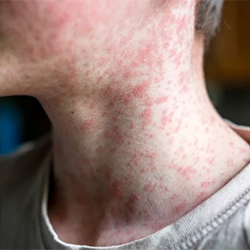Glenn Fennelly, MD, MPH, a pediatric infectious disease specialist and the assistant vice president for Global Health at Texas Tech Health El Paso, and the board president of Doctors of the World, sat down with us to talk about the current measles outbreak in the U.S. Southwest, which is now totaling 90 cases. Dr. Fennelly, who had first-hand experience with an outbreak in New York City in the early 1990s, told Infectious Disease Special Edition, that in times of outbreak such as these, physicians should “stick with the evidence that we reassure families that the vaccine is safe and effective, that there is absolutely no proven or scientifically validated link to autism, and it's important to anticipate questions about the vaccine and vaccine safety.”
This transcript was made by the AI transcription service, Otter.ai
Glenn Fennelly, MD, MPH 0:10
Hi. My name is Dr. Glenn Fennelly. I'm a pediatric infectious disease specialist, and I'm assistant vice president for Global Health at Texas Tech Health El Paso.
Dr. Fennelly 0:26
Currently, there's an outbreak centered in western Texas and parts of eastern New Mexico, adjacent to Texas. There have been several dozen cases, mostly in individuals between five and 17 years of age. The majority of these are individuals that have not been vaccinated, according to reports. What's striking is the relatively high proportion of individuals that have been reported to need hospitalization. Generally, maybe one in five victims of measles need to be hospitalized due to complications. Here, it seems to be tracking higher, maybe a third or so are requiring hospitalizations. In general, the complications can include sort of a straightforward viral pneumonia, a bacterial complication. Measles is a strongly immunosuppressive virus. The major cause of death from measles is a bacterial pneumonia super infection. Can also see a bacterial tracheitis, bacterial gastroenteritis, and there can be, more rarely, central nervous system complications. There can be a measles lingual encephalitis, but generally, that's seen in a very small proportion
Dr. Fennelly 1:42
In this area, it seems that there are very low rates of immunization. It's been reported that one in five children entering kindergarten in the counties most effective have not received their measles vaccination, whereas we aim to have 95% or more of a population vaccinated to ensure adequate herd immunity.
Dr. Fennelly 2:11
In general, there has been a trend towards vaccine skepticism in the United States in general, there's a pretty hard and fast proportion of children that cannot be vaccinated for medical reasons. Generally, that's well below 2% and those reasons could be that, yes, they have an inborn immunosuppressive disorder, they may have HIV or AIDS, which is less and less common in the United States. They may be undergoing cancer chemotherapy, so those children cannot or should not be vaccinated. Other reasons could be if they have a severe allergy or anaphylaxis in relation to any of the components of the vaccine. In general, in communities across the US, rates of nonreligious exemptions are sort of so called "personal belief exemptions" have been growing, and that seems to be the case currently. That's contributing to the outbreak in Texas. It's important that that, you know, we stick with the evidence that we reassure families that the vaccine is safe and effective, that there is absolutely no proven or scientifically validated link to autism, and it's important to anticipate questions about the vaccine and vaccine safety. Certain practices are going in the direction of maybe doing an intake questionnaire on families before the first-time visit to sort of try to anticipate whether these questions will come up, and to allow extra time to address them.
Dr. Fennelly 3:54
The cardinal signs of measles are cough, coryza, as it's called, or a very congested nose, and conjunctivitis or red eyes. These appear before the rash. The rash generally begins to appear in discrete sort of red dots, and also before the onset, or around the time of onset of rash there is a very pathognomonic finding, which is so called koplik spots. These are sort of grains of sand atop a very small red dots or clusters of dots near the buccal mucosa near the posterior lower molars. Few physicians are familiar with this. I saw this a lot. Back in the early 1990s when we had an outbreak, in the context of a nationwide outbreak. In New York City, we had 1000s of cases. We saw many, many cases early on. Ideally, though, we can anticipate when these cases are coming in, meaning, if there's a suspected case, the parents are in touch with the pediatrician if the child needs to be seen in the office or in the emergency department, ideally, they will be isolated immediately. Exposure to measles in urgent care settings was a major risk factor to get measles during that outbreak back in 1990 to 1991.
Dr. Fennelly 5:26
It is somewhat rare, and a main reason for that was in response to the outbreak back then, it was recognized that a single dose immunization was not sufficient. So single dose generally was given as late as 15 months of age. The vaccine cannot be given effectively before a year of age in many infants because they still have antibody acquired from the mother that can interfere with the vaccine, which is a live vaccine, and it's given along with two other live attenuated vaccines, mumps and rubella. It's only about 93% effective after a single dose. A second dose will bring that up to 97% or higher. And in giving a second dose, we don't actually boost immunity. We sort of immunize those children where the vaccine didn't take for whatever reason the first time around. So that was a major contributor. Also, there was a lot of awareness that adults maybe hadn't been vaccinated previously could be vulnerable. So we did very well getting up to high percentage coverage. By 2000, measles was considered eradicated in the US and was nonendemic. We've come very close to losing that status of measles illuminate ... elimination, rather. The closest we came was in 2019 where measles circulated in a sustained way for 11 months up through the fall of 2019. Also, it's striking that four European nations have lost their measles elimination status within the last six years or so, back in 2018 to 2019 because of new outbreaks, and again, the major factor for this is vaccine skepticism, vaccine refusal. So it's very, very important that we focus our energies on engaging families, on doing as much as possible as physicians to speak out about the facts about the safety and effectiveness of childhood vaccines and other vaccines.




